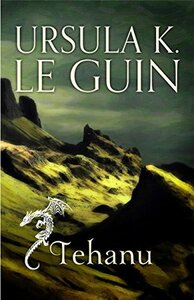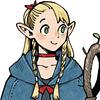You need to sign in or sign up before continuing.
Take a photo of a barcode or cover
This was less epic and more personal.
I really liked it despite some meandering and vagueness.
It was ruminatory. Is that a word?
it felt more like short fiction and not just in comparison to today's massive fantasy tomes.
There was no constant sailing but some would say the recounting of every day life was similarly monotonous. I didn't find it so.
I really liked it despite some meandering and vagueness.
It was ruminatory. Is that a word?
it felt more like short fiction and not just in comparison to today's massive fantasy tomes.
There was no constant sailing but some would say the recounting of every day life was similarly monotonous. I didn't find it so.
I’m so happy I re-read this. Le Guin’s Earthsea trilogy was my first exposure to her work. I read and loved them as an early teenager. I eagerly read Tehanu when it first came out and was baffled and disappointed. It explores and celebrates aspects of human life so different from the first three books. I couldn’t or wouldn’t make that new journey with Le Guin then.
This time around, I loved it. I loved the exploration of characters that choose a variety of paths. I loved the rambling, determined not to reach a conclusion, discussions about life and purpose and gender and power. I loved the thrilling, slow build-up of Tehanu as a powerful character. Perhaps it's just aging and my changing and growing perspective that let me appreciate it. Perhaps it's a deeper appreciation for Le Guin's writing and thinking after reading so much of her Hainish cycle. Regardless, I love returning to this and being proven wrong in my first impression.
This time around, I loved it. I loved the exploration of characters that choose a variety of paths. I loved the rambling, determined not to reach a conclusion, discussions about life and purpose and gender and power. I loved the thrilling, slow build-up of Tehanu as a powerful character. Perhaps it's just aging and my changing and growing perspective that let me appreciate it. Perhaps it's a deeper appreciation for Le Guin's writing and thinking after reading so much of her Hainish cycle. Regardless, I love returning to this and being proven wrong in my first impression.
Although it takes place in Earthsea, this volume is so different from the others. Instead of portraying some adventurous quest or rescue, it’s about ordinary life and the meaning found in everyday struggles. Yes, there are some conflicts to be resolved, but that feels secondary to Tenar’s determination to keep her adopted daughter safe. The original trilogy is thrilling; this volume is moving.
Skimming reviews and I feel compelled to say this: If you didn’t think there were social and political undertones in the first three books of this series, you need to reread them.
The young wizard in training from the first book is now a seasoned master. He is also a teacher. Great way to come full circle.
Coming to Earthsea for the first time in my 30s, I found the trilogy a fun and quick read, but certainly not lacking in world-building. I thought [b:The Tombs of Atuan|13662|The Tombs of Atuan (Earthsea Cycle, #2)|Ursula K. Le Guin|https://i.gr-assets.com/images/S/compressed.photo.goodreads.com/books/1417900879l/13662._SY75_.jpg|1322146] was the strongest of the three, so I was excited to see Ged and Tenar meet again. Unfortunately, you might call this 'the Seinfeld of Earthsea'; it's a book about nothing. It explores class and gender dynamics in Earthsea through the lens of 'everyday lives'. But there's just no getting around the fact that reading about the everyday lives of ordinary people (even in a fantasy world) lands squarely in the territory of homework, not pleasure-reading.
I'm glad we got some kind of resolution to the Ged/Tenar story, but all of the salient parts of this book could have been condensed into a short for the following (and even more disappointing) [b:Tales from Earthsea|13659|Tales from Earthsea (Earthsea Cycle, #5)|Ursula K. Le Guin|https://i.gr-assets.com/images/S/compressed.photo.goodreads.com/books/1309202073l/13659._SY75_.jpg|65982].
I'm glad we got some kind of resolution to the Ged/Tenar story, but all of the salient parts of this book could have been condensed into a short for the following (and even more disappointing) [b:Tales from Earthsea|13659|Tales from Earthsea (Earthsea Cycle, #5)|Ursula K. Le Guin|https://i.gr-assets.com/images/S/compressed.photo.goodreads.com/books/1309202073l/13659._SY75_.jpg|65982].
What can I say about this book? Do you want some philosophy with your fantasy? Want to think about what it means to be human? What does it mean to be a woman, a man, a being? What does power mean, and how does it defy you? Who are you when your power is stripped away or you realize you have never had any? This is no grand adventure of men and magic, but rather a true introspection examining humanity, gender roles, Earthsea, and ourselves. This book might not be everyone's favorite book, but I think everyone should read it and take a good long think.
Felt like nothing happened in this book but also felt like a lot happened somehow.
A Tehanu, ens retrobem amb la Tenar, anys després del segon llibre, que ha passat de ser una sacerdotessa encadenada a un laberint subterrani a la vídua d'un granger, de fills que ja han deixat el niu i protectora d'una nena a qui han maltractat i cremat. És el llibre amb menys aventures èpiques dels quatre: ens parla de les històries dels no-herois, sobretot de les dones i la canalla, dels qui es queden, dels qui renten plats i curen ferides. Fins i tot en Ged ha canviat. I, en canvi, té la mateixa profunditat que tots els altres. No fan falta grans viatges per arribar ben endins.
Le Guin sempre deia, en els seus darrers discursos, que si hagués començat a escriure més tard, hauria escrit diferent. Amb Tehanu, es nota el salt increïble: tot i mantenir el seu estil tan poètic i filosòfic, les seves idees estan molt menys tintades de patriarcat (uh! He dit la paraulota!). És com que s'allibera de tot i es deixa anar. Explica què ha implicat sempre ser dona, ser nena, valdre menys, callar. I no ho explica ni amb sermonets ni amb vehemència, sinó d'aquella manera tan natural com ho escriu tot.
M'ha sorprès, bàsicament perquè fins que no he llegit Tehanu no m'he adonat de la influència absolutament masculina que recau en els seus llibres més antics (deixant de banda el gènere dels protagonistes). Com tots els altres llibres, però, és un gaudi entrar en les seves descripcions del món de Terramar i les converses. I malgrat que les històries són més terrenals, continua havent-hi el toc èpic. I els dracs que no hi faltin. Mira que les històries de dracs no em tornen boja, però amb Le Guin me les menjo tan a gust.
Le Guin sempre deia, en els seus darrers discursos, que si hagués començat a escriure més tard, hauria escrit diferent. Amb Tehanu, es nota el salt increïble: tot i mantenir el seu estil tan poètic i filosòfic, les seves idees estan molt menys tintades de patriarcat (uh! He dit la paraulota!). És com que s'allibera de tot i es deixa anar. Explica què ha implicat sempre ser dona, ser nena, valdre menys, callar. I no ho explica ni amb sermonets ni amb vehemència, sinó d'aquella manera tan natural com ho escriu tot.
M'ha sorprès, bàsicament perquè fins que no he llegit Tehanu no m'he adonat de la influència absolutament masculina que recau en els seus llibres més antics (deixant de banda el gènere dels protagonistes). Com tots els altres llibres, però, és un gaudi entrar en les seves descripcions del món de Terramar i les converses. I malgrat que les històries són més terrenals, continua havent-hi el toc èpic. I els dracs que no hi faltin. Mira que les històries de dracs no em tornen boja, però amb Le Guin me les menjo tan a gust.






